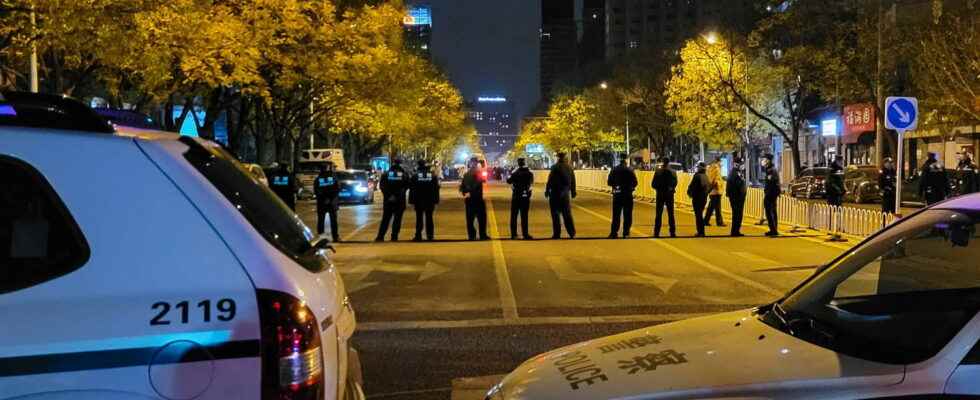CHINA. Demonstrations to denounce the zero Covid strategy are multiplying in China after repeated localized confinements. What are these health restrictions? Can it be abandoned by the Chinese government?
“We are tortured by a small cold”. In China, the very strict sanitary measures imposed by the zero Covid strategy are compared to torture and sometimes to dictatorial measures. The expression uttered by a citizen living in the city of Zhengzhou where six million people were confined on Thursday, November 24, 2022 has since been taken up as a slogan and shows the population’s refusal to continue to live at the pace of health restrictions. The rejection of the zero Covid strategy, in place for three years in the Asian country, is at the heart of the demonstrations which have shaken China and the government of Xi Jinping since Sunday, November 27. What are these restrictions decried by Chinese citizens? Can the uprising of part of the population put an end to the health policy of the Chinese Communist Party?
Numerous confinements since 2020
China, and the city of Wuhan, were the starting point of the Covid-19 pandemic at the end of 2019. If in the first months of the epidemic, China was one of the first nations to choose confinement, in very localized areas only, to prevent the circulation of the virus, three years later, it is the only country to still use the quarantine system against covid-19. A situation due to the zero Covid strategy, the objective of which is to make the disease disappear by preventing the virus from circulating via the “test, trace, isolate” method. On November 24, 2022, when 675 cases of coronavirus had been detected in addition to many cases of asymptomatic people in Zhengzhou, in the center of the country, the government decreed the confinement of six million people.
Confinements and sanitary bubbles for the zero Covid strategy
In the event of confinement, the Xi Jinping government delimits the confined area via barriers and prohibits access to the perimeter. Residents of this area are urged not to leave their homes “unless necessary” and many are forced to stop working. The release of those forced into quarantine is only possible upon presentation of a daily negative test to the authorities posted around the confined area. In addition to the confinements put in place when a possible epidemic focus is discovered, part of China also lives in sanitary bubbles. These bubbles are used by certain infrastructures to prevent those present from being in contact with individuals positive for covid-19 and in turn contaminating those around them. Sanitary bubbles had been put in place in some Chinese universities, but the latest was born at Foxconn, the largest iPhone factory in the world, still in Zhengzhou. On site, hundreds of thousands of employees are prevented from leaving the premises: after their day’s work at the factory, the workers are housed in buildings made available.
Why is China still defending a zero Covid strategy?
By adopting the zero Covid strategy and persisting with these health restrictions to fight covid-19, China is the only country that has not accepted to live with the virus. The strategy appeared to be the winning choice in the early stages and at peak times of the outbreak with case numbers well below those of countries ten times smaller than the Asian giant. But in 2022, the trend is reversed and China suffers the consequences of the zero Covid strategy with a population with very little immunity to the virus. The use of confinements has become one of the only means of preserving the country from a new epidemic episode.
In addition to a low immunity normally acquired during contamination, populations vulnerable to covid-19 such as the elderly or people with health problems are poorly vaccinated in China. A consequence of the government’s vaccination strategy which has favored the vaccination of active citizens rather than that of people who no longer travel, without taking into account the risks and the virulence of the virus in fragile people. And even if a majority of Chinese are vaccinated, the vaccination coverage is insufficient to effectively limit the circulation of the virus without containment. Especially since the effectiveness of Chinese vaccines does not reach that provided by messenger RNA vaccines.
Can China abandon the zero Covid strategy?
Can the ultra-restrictive zero Covid strategy last in China? After three years of repeated localized confinements, demonstrations are being organized in all the major cities of the country to denounce the health policy. The movement is on an unprecedented scale since the Tiananmen protests in 1989 and is exerting pressure on the Chinese Communist Party. But according to Antoine Bondaz, researcher at the Foundation for Strategic Research and China specialist interviewed by TV5 World, the disputes are localized in the regions and cities affected by the restrictive measures. “These are hyper-localized phenomena that will be managed, but it won’t challenge the CCP’s strategy, as long as it doesn’t generalize to the whole country, and for now, it’s not the case. “, he analyzes.
Other arguments suggest that Xi Jinping’s government will not abandon the zero Covid strategy. First of all, health elements: given the insufficient vaccination rate, the end of the confinements would lead to an unprecedented increase in cases, but the Chinese hospital infrastructures are not able to ensure the massive care of patients. The last argument is more political. In the first months of the epidemic, the Chinese government boasted of its victory over covid-19 and the success of its zero Covid strategy, which was more effective than Western methods. Changing its mind today would be an admission of weakness for the country which presented itself as the one which “saves people, that it protects them, unlike the Westerners who let them die”. Above all, ends Antoine Bondaz: “If he starts to relax sanitary measures, there will be a lot of deaths and this will also paralyze the country’s economy”.
